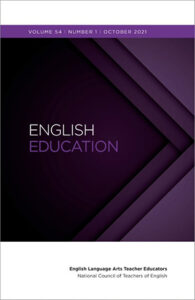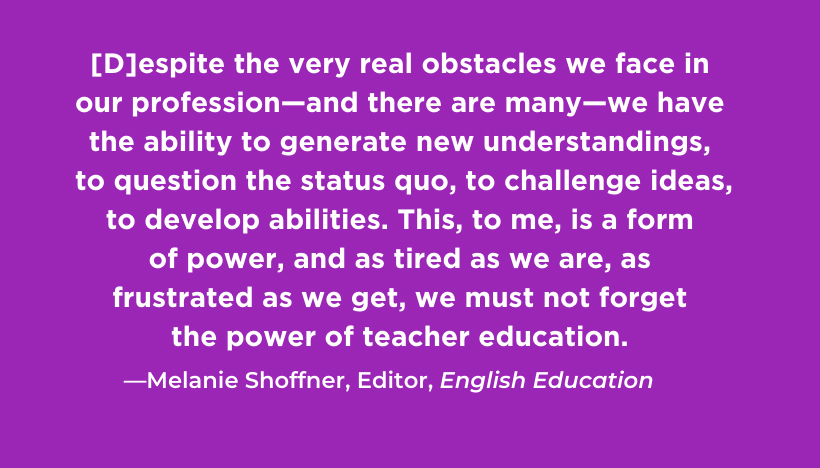This post comes courtesy of the “Editorial” column by Melanie Shoffner in the October 2021 issue of English Education.
Thing 1
I am tired. Being the type of person who easily stays up until 3 a.m. yet struggles to make 9 a.m. meetings, I could probably do with more sleep. Increasing my vitamins and vegetables would probably help to fuel all the writing, reviewing, planning, grading, meeting, and emailing required these days (the caffeine intake is already turned up to 11). I hear good things about exercise as a way to boost energy levels; I also hear good things about tofu, but neither of them figures largely in my life. Besides, physical isn’t the tired I’m talking about.
My mind is tired, “tired with nothing, tired with everything” (Fitzgerald, 2019, p. 169). The last year and a half of pandemic upheaval, societal turmoil, political idiocy, and professional pivoting has been exhausting, although it took some time for me to realize just how much so. When you’re slogging through the swamp, you don’t stop to take in the view; you keep dragging one foot after the other until you reach solid ground (or get swallowed in the mire).
There’s no need to belabor the point, since I strongly suspect everyone reading is nodding in recognition. And that only speaks to the collective exhaustion everyone in education—everyone, period—is managing right now as we continue our slog.
Thing 2
I am lucky to be a teacher educator. I don’t always resemble that remark—usually when I’m buried under unit plans or editing a manuscript at 8 p.m. on a Saturday or explaining, yet again, how teaching is a complex endeavor so, no, those who can’t definitely don’t teach, which is why education is a profession, not a hobby, and I cannot believe I have to keep saying this—and I freely admit to musing “if I had. . .” when things are rough.
But. I get to work with enthusiastic students and invested colleagues. I get to teach adolescent literature and instructional methods and curriculum theory. I get to ask questions and figure out the answers. I get to challenge racism and bias and close-mindedness. Once upon a time, I got to travel around the world to do these things, and even though I miss the world so very much, 15 minutes of travel across town offers the chance to do those things every day.
I didn’t follow a well-traveled road into academia, so a fair amount of directional luck (and stubbornness) was involved when I reached an intersection. Navigating the professional hairpin turns and blind corners still requires a bit of luck (and stubbornness). So, while I may not have known where I was going—and perhaps never will—I recognize how fortunate I am to do what I do.
Thing 3
 I am very happy to share this issue of English Education. The resplendent purple cover marks the shift from Volume 53 to Volume 54. Why purple? you may ask. Well, I would answer with this: Purple is frequently associated with royalty, which teacher educators are unfortunately not (although we’d look awfully good in crowns—fitting regalia for NCTE 2022, perhaps?). Purple is also associated with power, and despite the very real obstacles we face in our profession—and there are many—we have the ability to generate new understandings, to question the status quo, to challenge ideas, to develop abilities. This, to me, is a form of power, and as tired as we are, as frustrated as we get, we must not forget the power of teacher education.
I am very happy to share this issue of English Education. The resplendent purple cover marks the shift from Volume 53 to Volume 54. Why purple? you may ask. Well, I would answer with this: Purple is frequently associated with royalty, which teacher educators are unfortunately not (although we’d look awfully good in crowns—fitting regalia for NCTE 2022, perhaps?). Purple is also associated with power, and despite the very real obstacles we face in our profession—and there are many—we have the ability to generate new understandings, to question the status quo, to challenge ideas, to develop abilities. This, to me, is a form of power, and as tired as we are, as frustrated as we get, we must not forget the power of teacher education.
The articles in this issue channel the power of new and renewed perspectives. Emily Machado and Grace Cornell Gonzales complicate our understandings of writing by exploring translanguaging’s support of linguistic and racial diversity in writing teacher education. Kristine E. Pytash and Rhonda C. Hylton push against the boundaries of teacher education by examining how a field experience at a juvenile detention center supported the development of teacher candidates’ social perspective taking. Co-chairs Marshall A. George, Donna L. Pasternak, and Christian Z. Goering share the process undertaken by the 2019–2021 Steering Committee in developing the recently adopted 2021 NCTE Standards for the Initial Preparation of Teachers of English Language Arts 7–12 (Initial Licensure), while Christian Z. Goering challenges us to see these new standards as an important part of our antiracist praxis in his reflective reaction. Together, these articles remind us that, although we may be tired, we are indeed lucky to be teacher educators who believe in the power of our profession.
Reference
Fitzgerald, F. S. (2019). The beautiful and damned. Warbler Classics.
 Melanie Shoffner is a professor of English Education at James Madison University, and is editor of English Education.
Melanie Shoffner is a professor of English Education at James Madison University, and is editor of English Education.
It is the policy of NCTE in all publications, including the Literacy & NCTE blog, to provide a forum for the open discussion of ideas concerning the content and the teaching of English and the language arts. Publicity accorded to any particular point of view does not imply endorsement by the Executive Committee, the Board of Directors, the staff, or the membership at large, except in announcements of policy, where such endorsement is clearly specified.
6

